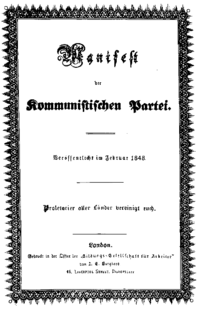The Communist Manifesto
|
|
Cmmalayalam.JPG
The Communist Manifesto, also known as The Manifesto of the Communist Party, first published on February 21, 1848 by Karl Marx and Friedrich Engels, is one of the world's most historically influential political tracts. Commissioned by the Communist League and written by founding Communist theorists Karl Marx and Friedrich Engels, it laid out the League's purposes and program. The Manifesto suggested a course of action for a proletarian revolution to overthrow capitalism and, eventually, to bring about a classless society.
The introduction begins with a call to arms:
- A spectre is haunting Europe -- the spectre of communism. All the powers of old Europe have entered into a holy alliance to exorcise this spectre: Pope and Tsar, Metternich and Guizot, French Radicals and German police-spies.
- Where is the party in opposition that has not been decried as communistic by its opponents in power? Where is the opposition that has not hurled back the branding reproach of communism, against the more advanced opposition parties, as well as against its reactionary adversaries?
It also drew on a sense of historical necessity, in the phrase The history of all hitherto existing society is the history of class struggles.
Program
The program described in the Manifesto -- that is to say, the policies the Communists of its day sought to implement -- is termed socialism or communism. These policies included, among others, the abolition of land ownership and the right to inheritance, the progressive income tax, and the nationalization of means of production and transport. These policies, which would be implemented by a revolutionary government (the dictatorship of the proletariat), would (the authors believed) be a precursor to the stateless and classless society envisioned by the socialists. The term "Communism" is also used to refer to the beliefs and practices of the Communist Party, including that of the Soviet Union which differed substantially from Marx and Engels' conception.
- When, in the course of development, class distinctions have disappeared, and all production has been concentrated in the hands of a vast association of the whole nation, the public power will lose its political character. Political power, properly so called, is merely the organized power of one class for oppressing another. If the proletariat during its contest with the bourgeoisie is compelled, by the force of circumstances, to organize itself as a class; if, by means of a revolution, it makes itself the ruling class, and, as such, sweeps away by force the old conditions of production, then it will, along with these conditions, have swept away the conditions for the existence of class antagonisms and of classes generally, and will thereby have abolished its own supremacy as a class.
It is this concept of the transition from socialism to communism which many critics of the Manifesto, particularly during and after the Soviet era, have alighted upon. Anarchists, liberals, and conservatives have all asked how an organization such as the revolutionary state could ever (as Marx put it elsewhere) wither away. Both traditional understandings of the attraction of political power and more recent theories of organizational behavior suggest instead that a group or organization given political power will tend to preserve its privilege rather than to permit it to wither away into a state of no privilege -- even if that privilege is given in the name of revolution and of the establishment of equality.
Modern Marxists respond to this by pointing out that the socialist state must always be a democratic one, and that it "withers away" by assigning increasing amounts of its power directly to the people (power that was previously held by the people's elected representatives in government). In other words, socialism fades into communism when the representative democracy of socialism fades into the direct democracy of communism.
The Manifesto went through a number of editions from 1872 to 1890. Written for a lay audience -- indeed, addressed to the common workers -- it is one of the most readable works of Marx. Historically speaking, it provides a foundation for understanding the motives and policies of the Communists at the beginning of their movement.
- The Communists disdain to conceal their views and aims. They openly declare that their ends can be attained only by the forcible overthrow of all existing social conditions. Let the ruling classes tremble at a communist revolution. The proletarians have nothing to lose but their chains. They have a world to win.
Effect on modern countries
Some measures recommended by the Manifesto are currently widespread in capitalistic countries. In particular, most western states adhere to the following Manifesto measures:
- A progressive tax system (generally thought to be meant as a temporary measure, although a subject of much dispute)
- Centralization of credit in the banks of the state
- Government education for all children in public schools, and the abolition of child labor.
Eben Moglen wrote the dotCommunist Manifesto in 2003, concerning the ways the movement for free information is changing society.
External links
- Template:Gutenberg — English edition of 1888, edited by Friedrich Engels
- Full text of the English edition of 1888 (http://www.marxists.org/archive/marx/works/1848/communist-manifesto/index.htm) from the Marxists Internet Archive
- A Marxism resource page (http://www.anu.edu.au/polsci/marx/marx.html)
- Only remaining page of the first draft of the Manifesto (http://www.iisg.nl/collections/manifest/manifest.html) in Marx's handwriting from the Marx papers at the International Institute of Social History.
- Images of English versions (http://www.rationalrevolution.net/special/library/communist_manifesto.htm)an:Manifiesto comunista
ast:Manifiestu comunista ca:Manifest Comunista de:Manifest der Kommunistischen Partei fr: Manifeste du Parti communiste es:Manifiesto del Partido Comunista ko:공산당선언 he:המניפסט הקומוניסטי mk:Комунистички манифест nl:Kommunistisch Manifest ja:共産党宣言 nn:Det kommunistiske manifestet pl:Manifest Komunistyczny pt:Manifesto Comunista ru:Манифест коммунистической партии fi:Kommunistinen manifesti sv:Kommunistiska manifestet th:คำประกาศเจตนาคอมมิวนิสต์ zh:共产党宣言

